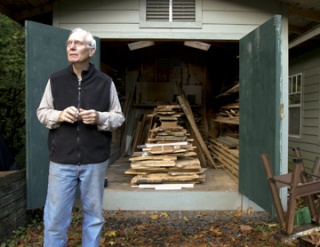Roger Lauen often profits from a solid windfall.
Not the financial kind, but the sort that tumbles down in the forest after a strong blow, and keeps his home woodshop stocked with material.
In his well-lit work room on Agate Point, windfall is reborn in useful household goods. A downed maple log becomes a stout door, cherry is transformed into a serving platter.
“This is like a woodworker’s paradise, living in the Pacific Northwest,” Lauen said. “Every time there’s a storm, it rains wood.”
While materials for woodworking are abundant on Bainbridge, shop space isn’t. Many amateur island woodworkers practice their craft in cramped back rooms, or competing with cars for space in cluttered garages.
“The problem with wood, is that if you want to do more than build a shelf, you have to have time, skills and space,” Lauen said.
It’s a problem Lauen and a newly formed group of islanders are hoping to mend.
They have plans for a cooperative community woodshop where members could work on personal projects, learn skills from woodworking classes and share camaraderie. The group will hold an introductory meeting Saturday at Eagle Harbor Congregational Church.
It has shared the plan with the park district board and Capital Facilities Committee, and hopes the district will consider hosting the buildings at one of its properties.
So far the plan has been well received.
Recreation Services Director John DeMeyer said a woodshop could be an asset for the park district as well. The district currently hosts woodworking classes in a 600-square-foot space at Camp Yeomalt. The space limits classes to relatively rudimentary wood skills. Students use basic hand tools to build sawhorses, tool holders an simple furniture.
A cooperative shop could help expand those programs and provide a social outlet, DeMeyer said.
“This would be a recreation activity we would be interested in,” he said.
The group estimates the shop itself would cost $100,000 to build and roughly $8,000 annually to maintain. At least labor would be cheap, constructing the building could be the first project tackled by the co-op members, Lauen said.
Roughly half of the space would be dedicated to tools, 1,500 square-feet would be populated by work benches, and space would be set aside for lockers and storage.
By sharing expenses, co-op members could outfit the shop with an array of specialized tools too large or expensive for most home shops, as well as a dust collection system.
“When you do things collectively, you can have more tools, more exotic tools and more specialized tools,” Lauen said.
The group hopes the woodshop would attract a wide range of members.
Tom Kilbane, who is supporting the woodshop plan and serves as president of the Bainbridge Community Senior Center, said there would be a large demand for the facility from retirees. Many avid woodworkers have downsized to condominiums or apartments in retirement, and no longer have the space they need to pursue their hobbies.
“They have been doing this sort of thing for years, but you can’t take your saws or your wood lathe into a condo,” Kilbane said.
Young people would be welcomed too. Lauen noted that just 20 years ago shop classes were an institution at most schools. At Bainbridge High School, well known shop teacher David Morley put his students to work during the Great Depression, building houses for islanders.
Today most of those shop programs have been replaced by technology labs, where students model 3-D buildings rather than lathing desk legs.
The community woodshop could offer classes for those high school and middle school students, and pass on carpentry skills.
Lauen would also like to see the shop used as an avenue for more women to become involved in the craft.
The group is aiming for a membership of 50 to 70.
Lauen believes all could benefit from learning a craft that teaches patience, self reliance and creativity.



